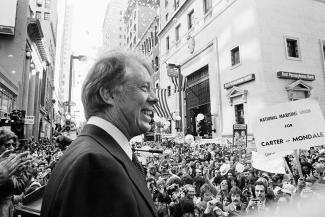
Among those interviewed in remembrance of the late Former President Jimmy Carter was Mary Frances Berry. Mary Frances Berry, the Geraldine R. Segal Professor of American Social Thought and professor of history and Africana studies emerita in the School of Arts & Sciences (SAS), served as assistant secretary for education in the Department of Health, Education, and Welfare in the Carter administration, and Carter later appointed her to the U.S. Civil Rights Commission.
Read her remarks in the following excerpt:
I’ll always remember the first time I met with President Carter. At the start of his presidency, when I was chancellor at the University of Colorado at Boulder, he invited me and a few higher education leaders to come to the White House to talk about what we thought were important issues going forward. He had this sweater on—I call it his sweater period—because he was concerned about energy and conservation and tried to keep the heat low. He sat there, listened, and took notes, and asked just a few questions. I was impressed by the attention he paid and the kinds of questions that he asked, and I thought he might not be a bad guy to work for.
Working with the president, I remember the conversations we had around questions of race and inequity more than anything. As a Southerner coming from Georgia and being what I thought of as a reconstructed racist—someone from the South who is white, who’s rebuilt their ideas of race after living in an environment where certain negative racial assumptions were always made—I always remember a speech he gave to a mostly white group of high school students from around the nation about the need for ending racial discrimination. He did it in a very enlightened and engaged way. People said he didn’t know how to make good speeches, but he made a good one that day.
When he took office, he did something very unusual. He appointed Patricia Roberts Harris as the first Black woman cabinet secretary. He appointed Blacks, Latinos, and Asian Americans as assistant secretaries and to other important positions around the government. His famous attention to detail was evident in trying to normalize affirmative action. He also had a very activist advisor named Midge Costanza who was the first woman to be a senior assistant to the president. One of her jobs was to keep all the advocacy groups and interest groups in connection with and informed about the president. She got the U.S. Civil Rights Commission to have the National Gay Task Force present testimony in an official meeting. They announced that it was the first time any lesbian or gay organization was able to give public testimony in one of the agencies of the federal government. The task force gave a presentation about how the commission might add discrimination against LBG people. The event was a milestone.
I give high marks to Carter as president and his post-presidential commitment to justice. He is one of the fighters. Admiral Hyman Rickover, who founded our nuclear sub command, used to come visit me to chat about improving K-12 education when I was assistant secretary for education. He would always remind me that Jimmy Carter was the smartest student he ever had at the Naval Academy and the smartest naval officer he had ever known. I’ve been acquainted with several presidents and other public officials, and he’s one of the finest presidents and most honest and self-critical public office holders I’ve ever known.
